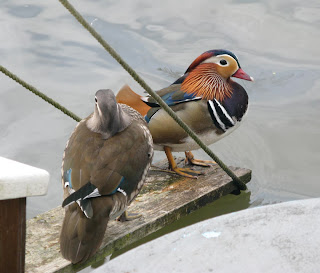Little Grebe
It has been one of the coldest Spring seasons on record and Easter Sunday was, over most of the UK, the coldest for many years with snow falling across much of Britain. The sun seems to have deserted these shores so Spring plants and flowers are reluctant to brighten up the landscape. One of the few benefits is that I have seen more of the secretive water bird, the little grebe. Because of all the rain that has fallen since May last year, the river has been in spate for many months and has only recently returned to normal flow. River traffic has been limited to essential journeys only and the water birds, including the more powerful swans, have struggled against the flow to swim upstream. Consequently, a little grebe (pictured above) took refuge from the flow in front of our home and spent several hours fishing and then grooming. It was a pleasure to watch such a beautiful, delicate, duckling size bird at such close quarters.
Cormorant on the hunt
Fewer cormorants have been about over the winter period, perhaps because it is more difficult for them to fish when there is such a strong current? No doubt they have found less turbulent parts of the river to dive for fish.
The "exotics" fight
In spite of the persistently cold weather the ducks know that Spring is in the air. Every morning we have had up to ten pairs of mandarin ducks and one pair of wood ducks turn up for breakfast. In the evening the same exotic birds put on an amazing performance before finally dining on the wheat they seem to love. For about an hour they show off and posture, displaying their feathers to advantage and trying to impress the rather indifferent females. This behaviour continued for several weeks but then it all changed when many of the female mandarins had chosen their partners and there was just one female being courted by at least seven mandarins and the wood duck. Because the female wood duck looks so similar to a female mandarin duck I have been unable to tell whether the mandarins were after the female wood duck or whether the wood duck just fancied his chances with a female mandarin. My instinct is that the mandarins were after the only female wood duck. The aerial displays were amazing and the ducks were more focused on flirting than on food but it has all suddenly stopped and since the weekend only a few pairs of mandarins are regular visitors.

Wood duck warns off a determined mandarin
The wood duck was less swift on the wing than the mandarins but he was more than a match when it came to seeing off his rivals on water. His strange vocal call, which sounds a little like static electricity, could be heard above all the burping and whistling sounds made by the male mandarins.
Mandarin displaying his fine feathers
Most of the displaying and flirting was performed on a neighbour's boat with up to 11 exotics lined up along the rim of the boat while most of the females ignored them. The one above was wiser and used our plank to show off to his 'intended'.
Poor old boy
For months we have watched this once proud mandarin deteriorate in health and mobility and we think he may have died during the most recent cold spell. He became so tame in his need for food that he would stand on the table and wait for me to put food out for him without flying off when I approached. He chose not to go too far away from the source of regular food and spent a lot of time resting on the boat next door. He found it difficult to walk because he would stand on one of his own feet and then stumble and he was bullied and chased off by other mandarins but I like to think that we looked after him as much as possible.
Long-tailed tit on feeder
There have been long-tailed tits on the island for some years though they have rarely visited our garden before now but at last we have at least five turning up regularly to enjoy the fatballs and peanuts. During December and January we also enjoyed the company of a grey wagtail which spent hours in the garden each day, especially once it discovered the mealworms we were putting down for the blackbirds, robins and dunnocks. The wagtail would eat its fill and then stand by the stash of mealworms as if to guard them from other birds. Now, all of a sudden, some starlings have discovered them too and, as they are greedy birds, not many mealworms are left for the wagtail and the other ground feeding birds.
Nest hunt
Two eggs were laid in one of our duck nest boxes in February and then there was no more activity for two months but, in the last week the ducks are searching for nest sites and one box in particular, the one with the eggs, has been visited by various female (and male) mallards, several pairs of mandarins, a moorhen and some tufted ducks. The other box is also checked out but this one seems to appeal to the ducks more. Dave put a camera inside yesterday and this morning we were amazed to see a female mallard sitting quietly inside the box with two eggs until she was chased off by a rival's drake. 'Duck TV' should be fun if a female is able to make the nest her own without being attacked by rival drakes.



















